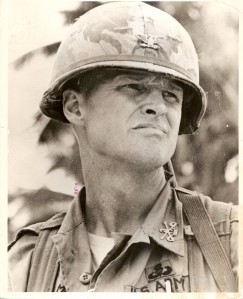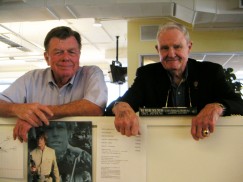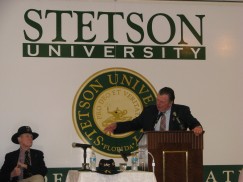General Hal Moore

I met General Hal Moore a few years ago, at a dinner in his honor in Los Angeles, around the time the movie We Were Soldiers was released. Both Joe Galloway and General Moore signed a copy of their book We Were Soldiers Once . . . And Young for me. General Moore added a note, citing a quote from my book, Gates of Fire, which he said reminded him of LZ X-Ray and his warriors in that fight. It was the quote about “Any army can win when it still has its legs under it; what counts is what they do when all strength has fled and they must produce victory on will alone.” That note means a great deal. Decades earlier, he and the 1st battalion, 7th U.S. Cavalry kept their legs under them during the battle of Ia Drang, and produced victory. And General Moore has continued standing strong since. A special thank you to Joe Galloway for providing the pictures accompanying this post.
SP: Of all the people I’ve had the honor to meet, you are without a doubt the one who knows the most about thinking creatively under fire—literally. Many of the readers of this series are artists and entrepreneurs, who are fighting their own wars every day. Bullets and bombs might not be flying, but the enemy (usually interior) can be pretty real just the same. That’s one reason why I wanted to talk to you, Gen. Moore—to see if we can cross-pollinate a little, from real war to the “war of art.”
One of the axioms you’re famous for is this:
“There is always one more thing you can do to increase your odds of success.”

Colonel Hal Moore
What would you share with civilians (and active-duty service members) about increasing success? In your years of service, what was it that you did to increase the odds?
HM: I learned early on there’s always one more thing an officer can do to increase the chances of accomplishing his mission and getting his men back alive. In fact, it’s incumbent upon any commander leading men into harm’s way to beat his brains out, ahead of time, to figure out that one thing—and every other element he can come up with, too. I instinctively think ahead. I run scenarios before things happen. I plan ahead for things I know are coming—and, more important, for what I don’t know is coming. Surprises. When you’ve rehearsed for multiple contingencies, even if it’s only in your imagination, you can deal with crises when they happen (and they always do) with a higher degree of calm, which in turn keeps everyone around you in a problem-solving mode and not a panic mode. I’m a great believer in reading. A military commander should know as much of the history of warfare as he can, so sudden reversals don’t catch him by surprise. There’s nothing new under the sun. Everything that happens to you and me under fire has happened already to Hannibal, Napoleon, Alexander, you name it.

Photo Credit: Chuck Kennedy/McClatchy. Joe Galloway and General Hal Moore at McClatchy Newspapers Washington, D.C. Bureau, 2008.
SP: I watched a Pritzker Military Library Interview with you and Joe Galloway—your co-writer of We Were Soldiers Once . . . And Young—during which you said:
“As was my practice in battle, I was the first man to set foot on the ground, leading my troops—not to be a hero, not to get a medal, but because it made a lot of sense.”
Being the first “in” is always frightening, whether you’re an artist or a warrior. In your case, at Ia Drang, you were the first on the ground—and you were testing an experimental tactic: the use of helicopters, leading the 1st Battalion, 7th Cavalry, the same unit General George Custer led in his notorious last stand. At what point it your career did you start “going in” first? Aside from it “making a lot of sense,” how did you know that was where you needed to be in order for you and your men to succeed?
HM: A leader leads. Setting the example is the best example. I believe I started “going in first” when I was in circumstances where I knew what to do and how to do it. There is the head part of leadership that comes from being fully prepared, and then there is the heart part that instinctively knows when to lead and how to do it. With me, I always felt I needed to do exactly what I expected others to do—and I do that by being the first boots on the ground and the last boots off. This makes sense to me. Plutarch wrote somewhere that there’s something in the human soul that, when it witnesses an act of courage or of integrity performed by another, is inspired to emulate that act. That’s why officers in the First World War would sometimes charge the enemy carrying nothing but a swagger stick. The act of courage itself inspired their men to follow. I guess I was never very good at fighting battles from the rear or from the air. It’s just my nature to be a warrior. I was born to lead, but I was not a born leader. That’s a tricky distinction. I had to be trained to lead. My young life consisted of reading every book I could put into my hands, praying with my family, and learning how to be obedient. When I finally got into West Point in 1942, the Academy put it all in perspective for me—duty, honor, country. In June 1945, I was ready “go in first” as many times as needed for the rest of my life. This too became second nature to me.
SP: You wrote:
“Some things happen in life that are a result of one’s total being responding to the moment for others. You do not think. You do not analyze. You do not measure. You act! Pure and simple. All the things you are trained to do come together as one.”
Artists and entrepreneurs can certainly relate to that (even though they may be physically safe in an office or a studio) because they often have to act in the face of what are, to them, overwhelming fears. How do you do this, Gen. Moore? Where does the strength come from? And how would you advise today’s service members in particular about acting in the moment—not overthinking or analyzing, but just doing?
HM: Two things: instinct and training. You have to trust your instincts. Don’t second-guess. But at the same time, proper preparations—mental as well as physical—makes all the difference because in the moment of fear you often can’t think, you can’t reason. You have to fall back on something and that something is training. If a soldier is poorly trained, having to act in the moment can be overwhelming, paralyzing. With me, training is everything—for myself and for those I have the privilege to lead. I never asked anything of a man under my command that I could not or would not do myself. You might find yourself in the thick of things you’ve never done before, but if you are well-trained, you’ll bring a level of confidence that can turn the moment in your favor. Training is the secret to just doing it.”
SP: When you and Joe Galloway wrote We Were Soldiers Once . . . And Young, how did you reconstruct everything that happened? Everyone involved was in the moment and there were so many people wounded and killed. How did you go back, years later, and manage to tell the story? And what was your goal in writing it?

General Hal Moore and Joe Galloway at Stetson University
HM: Our goal was simple: to tell the story of my great and courageous troopers—those that came home alive and those who came home dead. Every second of those three days in Landing Zone X-RAY—14–16 November, 1965—is engraved upon my heart. Time does not allow war to fade away. In writing the after-action report after it was all over, every single detail was clearly spelled out for others to learn from. That exercise in 1965 was the beginning of a book. But it took the wonderful passion, gifts and knowledge of Joe Galloway to make it happen. He was a 22-year-old reporter who showed tremendous guts. When we later talked about a book, we both saw in one another’s eyes the courage and sacrifice we had witnessed first-hand. No explanations needed. Reconstructing the training period, the battle and the aftermath of war was a long process, but it was not discovering new information. It was all about getting it right! Joe is a wordsmith and that is his business. Tactics and leadership are my business. We came together. In looking back, the book and the movie give credit to where all wars are won—to those who gave their all. Never a day goes by where I do not think and pray for my men and one day I will be with them again.
SP: Your granddaughter wrote a blog post about you. As I read it, I enjoyed her focus on your sense of humor:
“When I was little, Grandaddy wasn’t some hero soldier. He was just my silly grandfather, who made me laugh by sending me postcards with pictures of girls in bikinis sitting next to crocodiles. He’d send us Babar the Elephant books and as we read them, we realized he’d drawn pictures on some of the pages. He would have Babar smoking a cigarette, for instance. Little things to make us laugh. Grandaddy is always all about the little things.”
How do you balance the serious side of work with the not-so-serious side of being a grandfather, a father, a husband, and a friend? If you find yourself becoming too serious about something, what brings you back to center?
HM: I am naturally a very serious person. Humor and fun required work on my part. I could drill, work, fight, train 24/7. Often in my life, I have had to do just that. But the secret to my growing and developing balance in my life was the influence of my wife, Julie, and my children. They became my “vacation moments.” I needed them and I guess they needed me. Julie was the real general in our family. Another thing was our mutual love of the outdoors and recreation. We used this outlet to grow as a family. As to “Captain Fun,” I would put on that hat quickly and enjoy doing it. Just as quickly, I would take that hat off, put on my helmet—and enjoy doing that. I was made to soldier!
SP: No man, however gifted or driven, ever accomplishes anything by himself. Can you speak for a minute (don’t, if it’s too painful) about your late wife Julie—whom I was fortunate enough to meet at the premiere of We Were Soldiers in Los Angeles—and what that bond of love has meant to you over the years?
HM: Our bond of love was the coming together of two souls that God put together. When we were married, we became one. There was never a doubt in my mind that I had married up! She was an amazing woman. I always considered just how grateful I was to have married her. I never took her for granted—ever. She was my rock and my fortress. When she died after 54 years of marriage, I felt like someone had ripped by body into two parts. She died and half of me died with her. But God has other plans and I am ready to be with her again in eternity.
What has our bond of love meant to me over the years, you ask? Her love for me has meant the difference in life and death. In the worst of moments, when death was all around me, I saw God and Julie. I was ready to be killed or be given the blessing of returning home one more time for the love of my life. I can’t speak for others, but for me, yelling out when entering our home, “Julie, I’m home,” was a homecoming like no other. Her spirit remains with me in this house and I will die here. Every star I ever wore on a uniform was worn for my Julie!




General Moore and Joe Galloway are icons in military history. Their most recent book is entitled..We Are Soldiers Still…an account of their return to the battle site along with the NVA counterparts to pay homeage to those lost on both sides.
But, more compelling..Mrs. Moore passed away some years ago..and her wish was to be buried with the men she whose wives she comforted during the notices via Western Union of their deaths.
Mrs. Moore now rests with thosw who paid the price of that horrific day in the Ir Drang Valley.
RH-
Steven, Thanks for sharing. I met Joe Galloway in 2004 and read their book. Great people; extraordinary people!
A great companion book to “We were Soldiers” is “Heart of a Soldier” by James B Stewart. It’s a biography of Rick Rescorla, who was one of Moore’s platoon commanders at Ia Drang Valley. On 9/11 he was head of security for Morgan Stanley in the south tower. Because of the first WTC truck bombing he’d gotten the support of management to require all employees to participate in disaster drills. When the plane struck the north tower and Port Authority announced over the PA system that the situation was under control and people should stay where they were he told his team, “Screw them, we’re getting out.” He and his team evacuated 2700 employees from the building and when it came down Rick was on his way back up to make a last check for stragglers. He loved Hal Moore and stayed in touch with him.
Thank you Steven for this outstanding interview. Hal Moore is one of my leadership role models and heroes. Thought you should know I just saw a documentary on the history channel about the Long Range Desert Group. They mention Col. Sterling and Paddy. Semper Fidelis
The first and only time I saw this man was in the 1960’s when my father was stationed in Kodiak Alaska. I was very young, and because my father did not like me or my brother to watch anything to do with Vietnam I was only allowed a short few minutes. Those few minutes happened to be when the media crew were questioning him shortly after the end of that terrible battle. Of course, I did not know anything about the war nor understand what was going on. I am a US Navy Veteran and I have since my leaving the service learned about, heard about and have seen many great men and what they did in their service. I watched and loved and adore the movie We Were Soldiers. When I saw it, I realized that I remembered that one scene that I saw on actual TV. I would love to meet Mr. Moore, it would be an honor. Looking at him and learning the little bit I have learned about him, God proves Himself at how great He really is and what incredible things that last a long long time look like. When He acts, it effects much much more than one person can see. Hopefully, one day I will be able to get his book.
I just found this article while looking for a quote from LTG (Ret.) Hal Moore. The way you connected the artist and the warrior is amazing. A brilliant addition to both the discussion of the “Art of War” and the “War of Art.”
Thank You!
nb
General Moore is the mold of what an army officer should be. Leadership is something that can be learned and is usually learned from other qualified leaders by pure example. God bless General Moore and Joe Galloway!!
The very core of your writing whilst appearing reasonable in the
beginning, did not settle perfectly with me after some time.
Somewhere throughout the sentences you managed to make me
a believer but only for a while. I nevertheless have a problem with
your jumps in assumptions and you might do well to help fill in all those
breaks. When you actually can accomplish that, I would undoubtedly end up being fascinated.
This is the type of leadership that we need now, most then every other moment in out history.